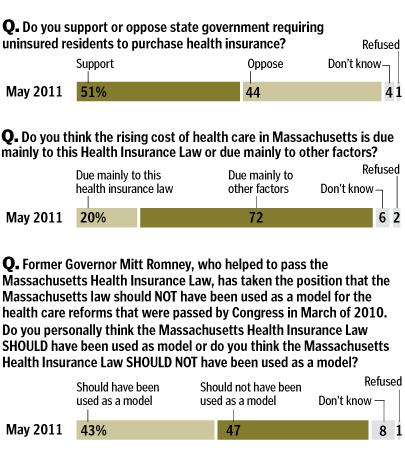MA Public Opinion of RomneyCare

Kay Lazar had an interesting piece in The Boston Globe on a joint survey with Professor Bob Blendon of the Harvard School of Public Health on Massachusetts health care reform. I am sure it will be part of the narrative of the presidential race.
Some general trends that they noted:
Increasing support for repealing the mandate.
Forty-four percent said they oppose the mandate in the Massachusetts law, compared with 35 percent who opposed it in a 2008 poll.
Residents don’t see a connection between the law and increasing health care costs.
Yet when asked about the law’s role in boosting health costs in Massachusetts, 72 percent said rising costs were mainly because of factors other than the law.
Perhaps this is because of all the local coverage on the Attorney General’s report on price differences at local hospitals and increases in utilization.
…residents are nearly evenly divided on whether it should have been used as a national model, with 47 percent saying it should not have been, and 43 percent saying it should have.
In a state that is so heavily Democratic and gave President Obama 62% of the vote in 2008, this was very surprising to me. I have asked Ms. Lazar and Mr. Blendon if they have data from 2009 in this issue. I will update if they reply.
Without seeing a further breakdown of the data, I am going to guess that at minimum independents are “ticket splitters.” They support the law in Massachusetts, but realize that the national law is more disruptive, is financed in a different manner, and has more uncertain outcomes. Pioneer has made this argument repeatedly here and here.
The poll results also showed that the highest income group, those whose income exceeds $75,000, were more likely than the lowest income group to say the law is hurting their health costs.
This is not all that surprising as any individual below 300% FPL ($32,670) or with a family of four ($67,050) will be on MassHealth (Medicaid), or publically subsidized insurance– such as CommCare– which would help cover increases in cost.
I have asked for data to be able to tell:
1) How many in the survey sample are receiving insurance from their employer?
2) How many are working at a small business vs large sized company?
3) How many are buying in the non group market?
4) On Medicaid, CommCare, Medicare?
5) Partisan, age, and income breakdown.
Of course the answers to these questions, have huge implications for if the individual surveyed was directly “impacted” by the law or not.


